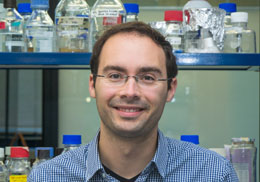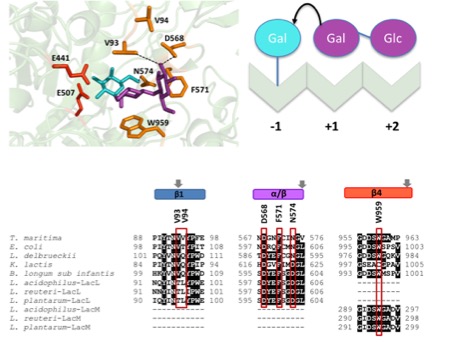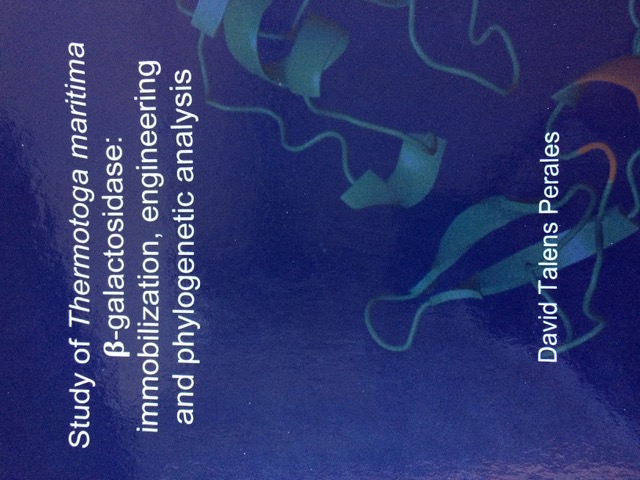
David Talens-Perales has received the 2017-2018 Outstanding PhD award for his thesis: “Study of Thermotoga maritima β-galactosidase: immobilization, engineering and phylogenetic analysis”. The research was led by researcher Julio Polaina of the Institute of Agrochemistry and Food Technology (IATA) and Julia Marin-Navarro, professor of Biochemistry and Molecular Biology at the University of Valencia and researcher at IATA.
David Talens-Perales holds a degree in Biology from the University of Valencia, where he also studied the Master’s Degree in Molecular Approaches in Health Sciences. At the Catholic University San Vicente Mártir, he obtained the Master’s Degree in Secondary Education. During his doctorate in biotechnology at the University of Valencia he completed a stay at the University of Tubinga (Germany) to receive training in bioinformatics. Currently, he continues the research derived from his doctoral thesis at the IATA Enzyme Structure and Function lab by Julio Polaina.
The thesis of Talens-Perales covers different areas of industrial engineering of enzymes and is based on galactosidases. These types of enzymes are those used to obtain lactose-free products, as well as to produce galactooligosaccharides, molecules with prebiotic properties that promote healthy growth of the intestinal microbiota.
The Talens-Perales research is based on the thermoresistant enzyme Thermotoga maritima, with which it carried out immobilization tasks to recycle the enzyme and leave no residue in the reaction product. In addition, targeted mutagenesis studies were also conducted to improve the production of galactooligosaccharides; and a bioinformatic study of enzymes of the same family to be able to discern about the possible candidates to be used like industrial enzymes.
What difficulties have you encountered when doing research? (issues related to field work, if you have had scholarships, how did you choose the doctoral program...)
I can say that I have been lucky enough and that I never lacked funding to do the research. I was able to develop the thesis, at the beginning, with a predoctoral scholarship from the CSIC and then with an FPU scholarship. With this last one I was able to teach as well as to enjoy a stay in Germany. However, getting these scholarships is not easy at all, as there is increasing competition and more candidates.
All this is derived from the lack of funding that makes possible that a laboratory can have money for material but not for contracts, in such a way that all those who want to do a doctorate must do so through a scholarship, and the number of candidates is increasing so exponentially that getting them in certain areas of knowledge requires at least an A grade.
What continuity does this work have?
This work has been used to develop some of the lines of work that are carried out in the laboratory. We continue to work with the enzyme to improve lactose activity, but most importantly, many other parallels have been derived from this work, which have served as the basis for end-of-degree or Master’s degree final projects or internships.
What do you think your research contributes to the scientific community as a whole and to society? And to you?
The expression “Every drop counts” is very true in the world of science. I do not consider that what I do deserves being front-page news, not even to be in a small section of science. The discoveries that really deserve it can be counted on the fingers of one hand. However, I think that even the most basic research that can be done is necessary, because it is never known where a discovery can appear that poses new challenges in science. The clearest example is that of Francis Mojica, where a basic microbiology research led to the discovery and application of the CRISPR system that is so trendy now in the field of molecular genetics.
Therefore, I think that, of course, taking into account that research is always based on previous knowledge that other scientists have done, my work will also be used by the scientific community as a starting point or as a source of contrast.
From a personal point of view, I believe that a doctorate, and later the research work that I am doing today, makes me learn many different things in many different areas. During a doctorate you learn to develop yourself as a scientist, but you also learn concepts of design, photography, management, economics... It allows you to find the tools to deal with the problems that appear along the thesis and personally learn to work in a team, namely controlling emotions and being consistent. It is necessary to think that a laboratory work involves a dedication that goes beyond working hours in all cases, and facing these conditions of pressure, stress and assuming negative results is something else that research gives you and makes you grow as a person.
What applicability can your work have?
When we manage to improve the activity of the enzyme it can be a good industrial alternative for lactose hydrolysis and the production of galactooligosaccharides because it is a very thermostable enzyme that would allow to reuse it, saving costs. In addition, bioinformatic screening can serve as a source for the search for new candidates in the production of galactooligosaccharides and lactose hydrolysis.
Does getting a Doctorate facilitate employability?
In this case I will give my opinion based on what I hear from colleagues who have been looking for a job. The doctorate is a totally unknown academic degree for people who do not belong to academia. While it is true, at present, thanks to television series such as “The Big Bang Theory”, society has understood that a being a doctor does not always mean being a medical practitioner. Sometimes I find it difficult to explain who I am and what I am doing. Based on this point, I think that an employer should not see a doctor as someone over-qualified for the job offered, but as a person capable of providing resources beyond the field that he or she dominates, and capable of dealing with problems of a rational and planned way.
Would you recommend starting doctoral studies? What advice would you give to a person who wants to get a PhD?
I would never dare to recommend to anyone starting their doctoral studies. Maybe it’s not the answer you were expecting, but I’m going to clarify. It is something that has to be one own’s idea, not the recommendation of anybody. Now, if the decision was made, the first advice that I would give any doctorate is to be consistent, to never lose hope, but above all to be humble. They are learning, and must always be advised by those who have undertaken the research path before them, because it is a way to save themselves from being upset and wasting time. The direction of the thesis and the company of the members of the laboratory, in the case of experimental doctorates, are fundamental because after four or five years of work you obtain results that you can defend before a court and obtain a doctor’s degree.
Have you actively participated in dissemination activities and scientific communication? How important do you think these activities are?
During the degree I noticed that it would be great to be able to get the knowledge that was discovering throughout the degree to society. That is why, the second academic year, I decided to start a blog that remains open today. During the degree I was showing the contents that most attracted my attention or that I considered that could be useful or interesting for those who did not belong to this area of knowledge. At present, it collects scientific news, discoveries, photographs of nature...
This blog also gave rise to the idea of making a popular science podcast called Science in Stereo. A total of 60 sound files presented by Manuel León, experienced radio announcer, where my current wife Chantal Deruelle Micó, also a biologist, and myself, talked about current issues and scientific curiosities.
I have also been involved in Expociencia, the open day of the Science Park. There I developed a workshop called “The power of your saliva” where young (and not so young) people learn the role of enzymes in the digestion of glucides, and more specifically of starch.
I think disseminating is an obligation that any scientist has. It is the way to make known and justify the money spent on science coming from taxes, after all, in Spain, the little funding received if public. Therefore, society becomes our patron and keeping it informed in an intelligible way is a way to be held accountable with it.
In what social networks can we find your work? Do you use Twitter for scientific dissemination?
I use Facebook and Twitter to spread the posts I added to the blog. I also recommend following the accounts of the different research centres or the “Science Sinc” page to stay informed on scientific news.
Blog: http://biogenmol.blogspot.com
Facebook: https://www.facebook.com/La-ciencia-de-la-vida-la-biolog%C3%ADa-316653815743/
Images:

.jpg)












